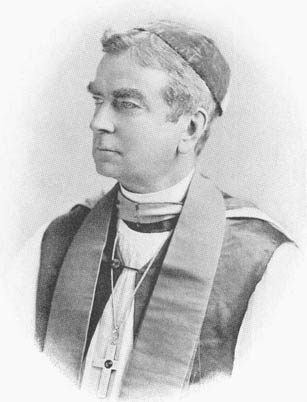

The Rt. Rev. Cyrus Frederick Knight, D.D., D.C.L.
Fourth Bishop of Milwaukee, diocesan 1889-1891A History of the Diocese of Milwaukee, by Harold Ezra Wagner
Diocese of Milwaukee, 1947.
Cyrus Frederick Knight was born in Boston, March 28, 1831 and pursued his education at Burlington and Harvard colleges, and his theological course at the General Theological Seminary, where he was graduated with the class of 1854. He received deacon's orders in Trinity Church, New York, July 2, 1854 from Bishop Wainwright. He was priested by Bishop Alonzo Potter in St. Luke's Church, Germantown, Pa., May 18, 1856.
During his diaconate he was assistant at St. Luke's, Germantown. After his advancement to priest's orders he spent some time in travel abroad, and then assumed the rectorship of St. Mark's, in his native Boston, where he stayed ten years. Called to the Church of the Incarnation (subsequently known as St. James) in Hartford, Conn., he continued in charge of that parish until 1877, when he became rector of St. James', Lancaster, Pa.
He was a deputy to the General Convention from Massachusetts, Connecticut and Central Pennsylvania during a period of nearly a quarter of a century. He was a member of the standing committee of the diocese of Central Pennsylvania, and twice visited the Triennial Synod of the Church in Canada as a representative of the American Church. He received Doctor of Divinity degrees from Bethany College, Kansas in 1880 and from Racine College in 1890. In 1885 he was made D.C.L. by the University of Bishop's College, Lennoxville, Quebec.
Bishop Knight was the first of Milwaukee's bishops to be consecrated in All Saints Cathedral in Milwaukee, which event took place on March 26, 1889,
His death on June 8, 1891 after only 26 months in the episcopate came as a sudden and unexpected shock to his diocese. He had scarcely had time to become acquainted with his jurisdiction. Bishop Knight was a man of broad learning and culture, with worldly knowledge and tact which he made peculiarly useful to the diocese in readjusting conditions which had been prolific with discord. When he came to Milwaukee he was in vigorous health. His death came as a result of a paralytic stroke preceded by an attack of the grippe. He was 61.Frederick Cook Morehouse says of him: "He . . . was instrumental in bringing about a gradual loosening of the narrow fractional lines which had once been so tightly drawn."
Project Canterbury